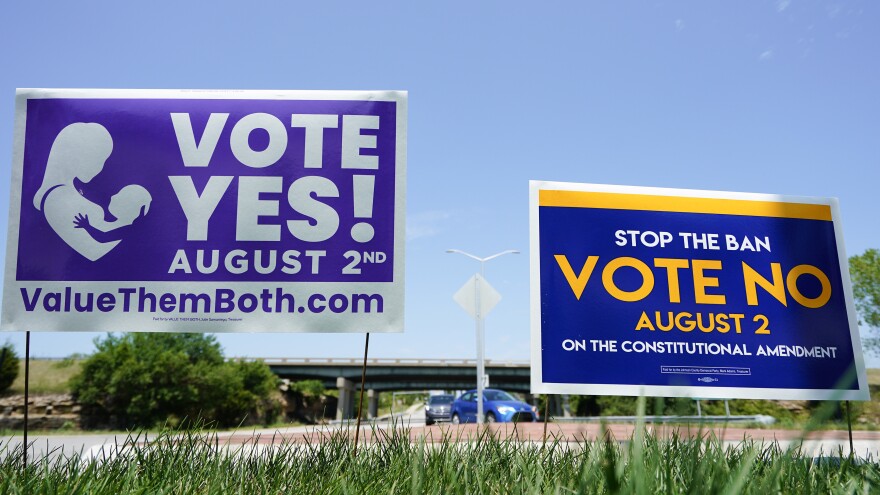Updated November 11, 2022 at 12:49 PM ET
Abortion rights supporters had a successful run of ballot measures this year.
In every state where voters were asked to weigh in directly on abortion rights, they supported measures that protect those rights and rejected initiatives that could threaten them.
Those victories have abortion rights advocates looking at where they can next take the fight directly to voters.
"Let's take this show on the road. Let's go to states, and let's prove that we can win in some challenging environment," said Anthony Romero, executive director of the American Civil Liberties Union. "Let's put this to the people."
Exploring options in red states
Romero, who spent election night in Michigan celebrating the passage of an amendment to protect abortion rights in the state's constitution, said his group is looking at several states as potential targets for future ballot campaigns, including Ohio and Florida.
Kelly Hall, executive director of the Fairness Project, which advocates for progressive-leaning ballot measures, said her organization is also exploring options in those states, along with Missouri, Oklahoma, Arkansas and South Dakota. She said gerrymandering in many states has resulted in lawmakers who support much deeper abortion restrictions than their constituents do.
Hall said the initiative process can serve as a check on overreach by state lawmakers — when there's a "huge gap between the desires of the electorate and the actions of politicians. And nowhere is that more the case in America right now than on abortion rights."
Loading...
A 'serious problem' for abortion opponents
Faced with these political losses, anti-abortion rights groups are emphasizing that they were outspent by their opponents in these campaigns. and they say they believe that voters were misled by some of the messaging around these initiatives.
Marjorie Dannenfelser, president of SBA Pro-Life America, told reporters on Wednesday that she's concerned more states will try to pass pro-abortion-rights ballot measures like those in California. Dannenfelser argued that it's often better for abortion laws to be made by elected officials after a robust public debate.
"It is the biggest concern that we have in the pro-life movement – that we gain our advantage that we find through candidates debating the issue – where we don't have that advantage when we're outspent 10 to 1 in a referendum," she said. "It is a serious problem."
The group's vice president of state affairs, Stephen Billy, said he believes abortion rights supporters want to "use the courts to try to take the issue out of voters' hands" by challenging anti-abortion laws in state court, and "use ballot initiatives as a way to thwart the legislative process."
A gap between legislation and public opinion
Advocates for bans on most abortions – including a wave of state laws passed in recent years that prohibit the procedure within the first several weeks – are at odds with public opinion, according to many years of polling. While most Americans support some restrictions on abortion, most support access earlier in pregnancy.
That's even the case in some deeply red states like Texas, where since 2021, when a unique state law took effect, residents have been seeing the impact of a ban on most abortions after about six weeks of pregnancy.

Romero, with the ACLU, said recent votes for abortion rights in red states show that many Republican-leaning voters are willing to cross party lines to push back against laws they see as overly restrictive. He accuses Republican elected officials in many states of "pandering to the most extreme portion of their base ... that's holding Republican voters and the broader public hostage."
"You have to leapfrog the governors, and you have the leapfrog the legislatures," Romero said.
Victories for abortion rights supporters this week in Kentucky and Montana followed a similarly successful fight in Kansas in August.
Ballot measures face their own challenges, risks
Many states lack a process for citizen-initiated ballot initiatives, leaving the question of abortion in the hands of their state lawmakers. According to the Fairness Project, such initiatives are possible in 22 states.
Even in those states, such efforts could face pushback from abortion opponents. Michigan's initiative survived Republican-led challenges aimed at keeping the measure off the ballot, including objections to the formatting and spacing of the language in the amendment.

Hall, with the Fairness Project, acknowledges there's a risk that abortion rights advocates might overplay their hand by putting the issue on the ballot and possibly galvanizing voters who will elect anti-abortion candidates.
But she said she believes that well-crafted measures, tailored to the specific concerns of voters in individual states, can gain bipartisan support.
"These need to be strategic decisions that meet the electorate where it is," Hall said. "I don't think though that we should shy away from having these deep, strategic conversations even in the reddest of places — because frankly there are no other options left in many states for how we advocate for people who need reproductive healthcare."
NYU law professor Melissa Murray said she believes there's a robust appetite among many voters to push back against some of the state restrictions that have taken effect in recent months, though the specific message and rationale will vary from state to state.
"California may have a different logic for this than Kansas, where the prospect of government encroachment might seem like the antithesis of conservatism," Murray said. "But it's all cashing out in the same way. Where voters have direct access to the ballot box to register their preferences on abortion, they are registering them in ways that make clear that there is ... appetite for greater protections for reproductive rights."
Copyright 2022 NPR. To see more, visit https://www.npr.org.




